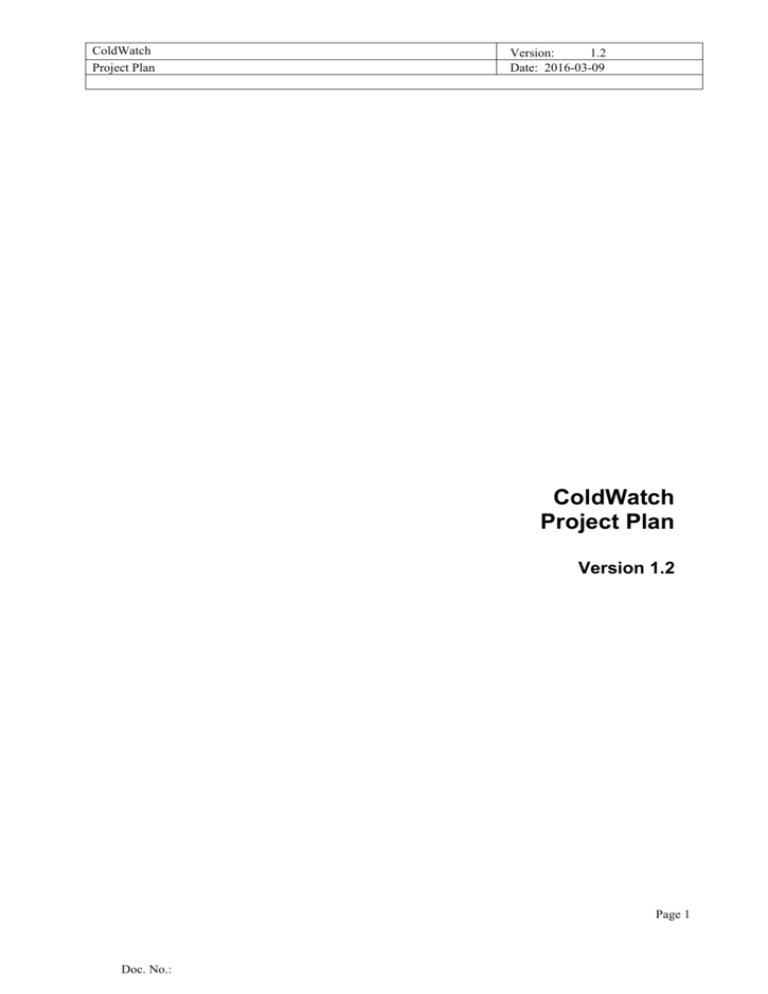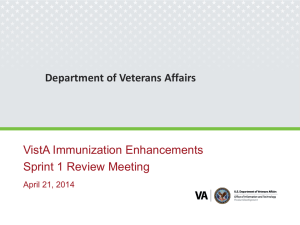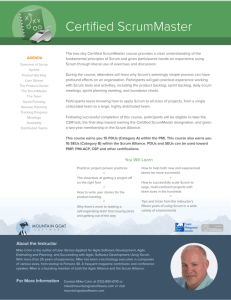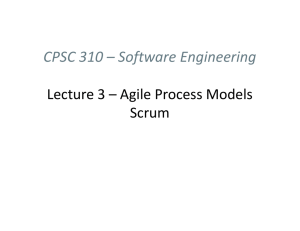Project Plan
advertisement

ColdWatch Project Plan Version: 1.2 Date: 2016-03-09 ColdWatch Project Plan Version 1.2 Page 1 Doc. No.: ColdWatch Project Plan Version: 1.2 Date: 2016-03-09 Revision History Date Version Description Author 2011-10-16 0.1 Initial Draft Luka Postružin 2011-10-17 0.2 Added Configuration Management Kristijan Šimunić 2011-10-18 0.3 Risk, Activity and financial plan updates Ante Ivanković 2011-10-19 0.4 Added Keywords and Acronyms Sreehari Vallu 2011-10-21 1.0 First final version Luka Postružin 2011-11-29 1.1 Luka Postružin 2011-12-03 1.1 Reviewed project plan, section 2.3. and section 6, section 7 Reviewed project plan, section 3.1, 3.2, 3.7. Angie Angarita Page 2 ColdWatch Project Plan Version: 1.2 Date: 2016-03-09 Table of Contents 1. Introduction ............................................................................................................ 5 1.1 Purpose of this document ............................................................................................... 5 1.2 Intended Audience ......................................................................................................... 5 1.3 Scope of this document .................................................................................................. 5 1.4 Definitions and acronyms ............................................................................................... 5 1.4.1 1.4.2 1.5 2. Definitions ....................................................................................................................................... 5 Acronyms and abbreviations .......................................................................................................... 5 References ..................................................................................................................... 5 Organization ........................................................................................................... 6 2.1 Project management ...................................................................................................... 6 2.2 Project group.................................................................................................................. 6 2.3 Project Scope.................................................................................................................. 6 3. Assumptions and constraints ................................................................................... 7 3.1 Environmental ................................................................................................................ 7 3.2 Time ............................................................................................................................... 7 3.3 Technology ..................................................................................................................... 8 3.4 Interpersonal.................................................................................................................. 8 3.5 Work distribution ........................................................................................................... 9 3.6 Causal relationships ........................................................................................................ 9 3.7 Project implementation schedule .................................................................................. 10 4. Deliverables .......................................................................................................... 11 5. Project risks .......................................................................................................... 11 5.1 6. Risk analysis ................................................................................................................. 11 Communication ..................................................................................................... 12 6.1 Communication applications and services ..................................................................... 12 6.2 Communication distribution ......................................................................................... 13 6.2.1 6.2.2 Weekly conference ....................................................................................................................... 13 Scrum communication .................................................................................................................. 13 7. Configuration management .................................................................................. 14 8. Scrum management .............................................................................................. 14 8.1 Scrum roles .................................................................................................................. 14 8.1.1 8.1.2 8.1.3 8.1.4 8.2 Product Owner .............................................................................................................................. 14 Team ............................................................................................................................................. 14 ScrumMaster ................................................................................................................................ 14 Parts of Scrum ............................................................................................................................... 15 Detailed definitions: ..................................................................................................... 15 Page 3 ColdWatch Project Plan 8.2.1 8.2.2 8.2.3 8.3 9. Version: 1.2 Date: 2016-03-09 Product backlog ............................................................................................................................ 15 Sprint backlog ............................................................................................................................... 15 Potentially Shippable .................................................................................................................... 15 Meetings ...................................................................................................................... 16 Project plan........................................................................................................... 17 9.1 Time schedule .............................................................................................................. 17 9.2 Activity plan ................................................................................................................. 17 9.3 Financial Plan ............................................................................................................... 17 Page 4 ColdWatch Project Plan 1. Version: 1.2 Date: 2016-03-09 Introduction 1.1 Purpose of this document This document describes ColdWatch project plan. It will be used as reference for project costs and development model. This document describes all the essential parts regarding architecture model and development process. 1.2 Intended Audience All of the people working on ColdWatch project, as well as our Supervisor and customer. 1.3 Scope of this document This document has project milestones which will be used during development process. Also, you can view tasks and project cost here through iterations, and some key things are explained for our users to understand them. 1.4 Definitions and acronyms 1.4.1 Definitions Keyword PostgreSQL SCRUM Dreamweaver NetBeans MS Visio 1.4.2 Acronyms and abbreviations Acronym or abbreviation PHP HTML XML CSS JSON SQL UML SVN GSN ETL MDH FER MOM SMS IDE 1.5 Definitions Open-source Database Methodology for system development Web Design Software IDE to write applications Commercial Diagramming Program Definitions Hypertext Processor Hypertext Markup Language Extensible Markup Language Cascading Style Sheets JavaScript Object Notation Structured Query Language Unified Modeling Language Subversion Global Sensor Network Extract, Transform, Load Mälardalen University Faculty of Electrical Engineering and Computing Minutes of Meeting Short Service Message Integrated Development Environment References Main reference to this project can be found on DSD webpage on FERweb: http://www.fer.unizg.hr/rasip/dsd/projects/coldwatch Project proposal can be found on this link: http://www.fer.unizg.hr/_download/repository/proposal_igor_slides.pdf Scrum references: http://en.wikipedia.org/wiki/Scrum_(development) http://www.scrumalliance.org/learn_about_scrum Page 5 ColdWatch Project Plan Version: 1.2 Date: 2016-03-09 2. Organization 2.1 Project management This project will be managed according to previous arrangements. Luka Postružin from Croatia will be project leader, while Angie Angarita from Sweden will be team leader. Other members need to communicate with their side leader, and from there information will arrive to the other side. Also, project leader is assigned to talk with our customer and supervisor, and he needs to be in close contact with them. 2.2 Project group NAMES ROLES RESPONSABILITIES Luka Postružin Project Manager Coordinating activities and communication, Database architect Angie Angarita Team Leader Coordinating activities and communication, Web designer Usman Alam Developer Web developer, SVN coordinator (MDH) Vallu Sreehari Tester/Developer Database developer, testing prototypes Matija Renić Developer GSN developer Ante Ivanković Developer Database developer, SVN coordinator (FER) Kristijan Šimunić Tester/Developer GSN and Web developer, testing prototypes The next diagram shows the Project organization hierarchy: 2.3 Project Scope ColdWatch is a system that deploys a solution for freezing pipe problem, and its beta version will be released by January, 2012. This problem occurs when there are ruptured water pipes in closed environment due to cold temperatures during winter, and it may cause severe damage. Thus, Cost of pipe repairs can be extremely high, so it is needed to implement a system for monitoring and signaling that collects, stores, and at the request of user, processes and displays data (temperature and humidity) measured by sensors placed at specific points. In addition, the system can automatically notify users about the alarming measured values via e-mail and SMS. The main goal of this project is to implement a Beta Version that will simulate this scenario based on data collection through a GSN server (Global Sensor Network) which will trigger alarms, warning messages and other kind of notifications. Besides, this system will be composed of five subsystems that are stated in figure 1. Page 6 ColdWatch Project Plan Version: 1.2 Date: 2016-03-09 Figure 1 ColdWatch components This project will be developed through collaboration between students from Mälardalen University and University of Zagreb. What can be seen on figure 1 are components of this system. Not all components will be developed throughout this project. Sensor system is one of the fields we will not be implementing. We will make a virtual environment on our GSN server, with virtual sensors that will represent real ones. These sensors will generate data according to our template that will be developed in the process. In our project we will also implement data extraction, transformation and loading into our data warehouse. This data warehouse will be made according to Kimball standards, with few modifications for our needs. After data is collected we will aggregate it and store in so called data marts that will allow us to have reasonably fast queries for later user reviewing. After collecting and archiving data, we will implement web interface for both, user and admin side, for more advanced usage of our system. User will be able, as written before, to subscribe to notifications and to view data and some generic reports. All these actions need to be secure in the system, and user roles must be present at all time. 3. Assumptions and constraints 3.1 Environmental For our purposes we will use three servers. This is optimal solution since our sensor grid could then be on a remote location from the interface, and if something is wrong with the network, user could still get some data, and also information regarding the system. These both servers are provided by University of Zagreb (FER). However, this resource is limited since we are going to have one physical server that will be virtually separated into those required number. Those two servers will be organized as: WEB application and Data Warehouse will be deployed on the same server (Debian). GSN server will be deployed on another server (Debian). IceScrum server will be deployed on another server (Debian). Another constrain is with respect to internet and network bandwidth with respect to given sources from FER. So this will represent a limitation with respect performance test. Besides, some policies must be implemented for using IceScrum since it has a limited number of users that can access efficiently due to previous point. 3.2 Time Delays of as much as a fortnight are permitted in order to assure the good quality and high-end of the product. Nevertheless, any delay will cause an impact in alpha and beta version delivery and project closure. Also, components that will be developed are intertwined throughout the process so any delay could slow down development of another one. As we are going to use Scrum (explained later) we will maintain our reports to suite our needs, and what is Page 7 ColdWatch Project Plan Version: 1.2 Date: 2016-03-09 expected from us to provide, the best. This will be done according to some standards that we have come up with that will be explained in some future documents. Another assumption is that this project will be developed by students in part time in conjunction with other assignments. So, work hours per week are approximately 20 hours. Besides, it is needed to consider Christmas holidays and exams periods where this stated workload will be decreased significantly. 3.3 Technology This project is based on event driven model combined to client server model. Event driven one is composed of Web server and GSN server, and client server one is composed of GSN mobile phones and/or workstations. Regarding to data generation and collection, it is not expected to develop a sensor subsystem because data will be collected from Global Sensor Networks project (GSN project) which is open source network where some parameters will be set to collect desired information and trigger alarms. With respect to web developing schema, a local server will be used in order to develop a certain component. Then, this will be updated at corresponding server. In particular, web application integration will be done in parallel by fulfilling standards, so main developer will commit this code every time that is needed in order to maintain a synchronization among all web application components and design layouts. Here are the technologies to be used. Server: Web Application PHP CSS XML HTML Java JavaScript JSON JQuery Client: Mobile Phones SMS platform Database SQL Java PostgreSQL database Server: GSN Java XML Eclipse environment Others UML MS Project Management MS Visio Magic Draw Dreamweaver NetBeans Dropbox SVN Google groups 3.4 Interpersonal Since our team is not only distributed, it is also multicultural. We have 4 different nations among ourselves and interpersonal communication and relations will be one of the primary concerns. We will address to this problem as much as we can to put the risk of misunderstanding and lack of language skills as far as we can. Needs to ensure such a communication can be divided into parts: It is needed to have an effective communication since this project is developed in a multicultural environment where headquarters are located in countries like Sweden and Croatia. Hence, communication with customers and supervisors is also a key for succeeding. Page 8 ColdWatch Project Plan Version: 1.2 Date: 2016-03-09 It should be reported by project leader to customer and supervisor our projects status, deliveries and other related elements. It is also important to establish a direct communication with stakeholders in order to get accurate requirements, software validation and verification, and customer acceptance as well. English is standard language to communicate and UML is other one for reporting technical specifications. Trustiness among team members is an important factor to succeed in this project. Communication should be divided into small working groups which then answer to project and team leader. 3.5 Work distribution Since we have a component driven system, with three primary components, we will try to develop such a system of work distribution to provide maximum effectiveness. These groups will be divided by previous knowledge and therefor those people will be considered equals and experts on that field. In a case of impossibility of finding a common solution inside the group, problem should be presented as soon as possible to our project leader (project owner) so he can take the risk of deciding to go with one solution. Main points of work distribution will then be: Periodical tasks will be assigned at the beginning of every sprint, so every team member has to talk to each other in group task or work on individual tasks. Tasks can be completed in a sequential way or in a parallel way. Some task can be shared from both universities, but they are mutually exclusive. This means that it can be completed independently. 3.6 Causal relationships Every risk has been assessed with great patience and we believe to have a good picture how to prevent or minimize the consequences. This will be done in a matter of project plan as a kind of a policy which we will be using. There are only two main points in it: An accurate architecture and design implies a successful project. A proper project organization and task distribution provides good cooperation among team members. Page 9 ColdWatch Project Plan 3.7 Version: 1.2 Date: 2016-03-09 Project implementation schedule Figure 2 Implementation and tasks schedule This picture describes basic deliveries and how we intend to work on them. As well, we have made a detailed requirements document (product backlog) from which we will choose requirements according to their level of priority in every sprint so on every milestone we can have a prototype that can satisfy our customers basic or all needs. Page 10 ColdWatch Project Plan 4. Version: 1.2 Date: 2016-03-09 Deliverables Deliverable/ Milestone Delivery Date Project vision & Plan / Lifecycle Objectives 2011/10/18 Requirement/Primary Architecture Design Specifications/ Preliminary Lifecycle 2011/10/23 Design/Architecture Specification / Lifecycle Architecture 2011/10/28 Software Integration Alpha Version/ Alpha Release 2011/11/22 Software Integration Beta Version / Beta Release 2011/12/13 Test Specification/ Test plan 2011/12/16 Preliminary Reports / Documentation 2012/01/09 Final Reports/ Documentation Release 2012/01/13 Final System/ Product Release 2012/01/13 5. Project risks Creating a Risk Management Plan is a critical step in any project, as it helps you to reduce the likelihood of risk from occurring. Regardless of the type of risk, you will be able to use this template to put in place processes and procedures for reducing the likelihood of risk occurring, thereby helping you to deliver your project successfully. 5.1 Risk analysis Risk Data loss Example Level Some files deleted by High mistake. Server got crashed. Prevention Regular backups is necessary Missing the internal If someone gets stuck in one Medium scheduled deliverables thing, then there might be chance that he will continuously look at the same issue, wasting the time that he has for something else. Flagging the issue in time. Lack of time for because of the exams DSD Since we have other courses High besides DSD it is possible we will have trouble finding time for this project when exams time comes. Take other courses seriously from beginning so that when exams we do not need to make a big effort. As well, before and after exams, working hours should be increased to compensate for the exams time. of In some cases we can choose High problematic areas wrong and group assigned won’t be able Based on the size, competencies of the team and available time, the scope of the project should be estimated Improper resources. estimation Page 11 ColdWatch Project Plan Version: 1.2 Date: 2016-03-09 to resolve the issues. appropriately. Lack of communication We are working in a Medium within team. distributed environment and have 4 different nations are present in our team. Every possible misunderstanding needs to be addressed as soon as possible and this will be task for project and team leader to keep track on. Unavailability of a member If someone is on leave for High week or a while, the entire deliverable should not dependent on that resource. That means if he is not there we cannot be in a situation that his part of work simple cannot be done. A good documentation of an individual work is required. Also, regular meetings are helpful, to know what an individual is doing. This will help even in the worst scenario in which we lose a person because of illness. Incompatible platforms Our project contains huge High development either from front end (web design) and back end (GSN server, web server) and they can be pretty much incompatible. A proper selection of the platforms at the time of initial planning is very important and we have done steps to prevent this risk. Also, if we find the chosen technology wrong in the time before prototype B there is still some time to change it but we need to be extra careful. Wrong estimation customers wishes of The end product should be Medium customer satisfied product. Proper estimation of what user is looking for needs to be done. We have already made many contacts and we intend to keep our customer up to date and provide him possibility of making small changes to the requirements if that will also be approved from our project leader. Nobody knows how to do a Medium part that of the project in technology that we have chosen Brainstorming at the beginning and going with the technologies that we are mainly familiar with were our goals in the last couple of weeks, and we will try to make some, or find some, tutorials regarding important technologies for the members that have less knowledge about them. Lack of knowledge 6. Communication 6.1 Communication applications and services A proper hand-over, take-over has to be done in such situation, and because of this, every absence that will prevent member to participate in the project work needs to be addressed minimum 2 weeks in advance. Since we are developing this project in distributed environment communication is of vital importance. We will hold video conference meeting every week to see how things are going and to discuss possible issues. Also, this meeting will be used to brief everyone about work that we have done. Also, besides that, we will communicate Page 12 ColdWatch Project Plan Version: 1.2 Date: 2016-03-09 on daily basis inside our workgroups. For communication we will use: Google + for video conference Google groups for discussions Dropbox for document sharing SVN for code sharing Gtalk for chat IceScrum for tasks distribution and process management Other services we find useful at the time 6.2 Communication distribution 6.2.1 Weekly conference We will have a weekly video conference that will be held, if possible, every Sunday. On that conference we will talk about previous weeks work. What has been achieved, what has been fully developed, and which problems we have encountered. Also, this meeting will be used for further task distribution. On the beginning of each conference, all the problems from project leader perspective will be briefed as main problems in the previous week’s development. 6.2.2 Scrum communication Special part of our development will be SCRUM management since this is the process of development that we have chosen. Because of the specific instructions regarding this management model we agreed on some standards and reports that should ease the process and communication. Each day every person should fill in his/hers own progress report. In this report is gather all the information regarding current day (what that person has done) and what that person will do in the following day. This will be used instead of regular daily video conferences since we will not be able to take so much time for it. As well as having progress reports, we have assigned component coordinators. Their job will be to manage and keep track of the specific component development and to report to project leader with any problems or valuable information. This will also save us time and make our team more responsible as a group. On the beginning of each sprint we will have a longer discussion for describing sprint backlog better if it will be necessary, so this will be considered an introduction to every new sprint we will have. This whole process will be defined later in more detail. Page 13 ColdWatch Project Plan 7. Version: 1.2 Date: 2016-03-09 Configuration management We will use SVN for code sharing and managing versions. We already have SVN policies, as well as the coding policies, which combined will be used for uniformed development. Regarding the documents that will not be used in final product coding process, such as references, documentation, templates, pictures, and so on, we will use Dropbox. Dropbox policy is already online, and will be used as such in the process. For the development methodology we will use SCRUM Framework. Scrum is an agile framework for completing complex projects. Although the Scrum approach was originally suggested for managing product development projects, its use has focused on the management of software development projects, and it can be used to run software maintenance teams or as a general project/program management approach. For easier manipulation of tasks and assignments we will use IceScrum application that will be deployed on one of our servers. We will have three servers in our development process, so that we simulate real life situation in the component based development. First server will be used for GSN, second one for Web interface and database, and third one for IceScrum application. We agreed on this since all of our servers will have big traffic congestion and are using different technologies to run. 8. Scrum management (Taken from Wikipedia and some other sources – general overview) 8.1 Scrum roles Scrum is a process skeleton that contains sets of practices and predefined roles. The main roles in Scrum are Product owner, ScrumMaster, Team. 8.1.1 Product Owner The Product Owner represents the voice of the customer and is accountable for ensuring that the Team delivers value to the business. This role will be taken by our project leader Luka who will be in charge of making priorities of our requirements. His role will also be to talk often to our supervisor and customer to see the response to our work so we can develop main parts of the project first, to ensure our customer happiness. 8.1.2 Team The Team is responsible for delivering the product. Our team is made by 7 people that we have already defined areas of expertise. These areas collide and as such will provide us little groups inside our project team that will be in charge of a certain component. Every component will then have meetings among themselves every day, and they will all need to fill in the daily scrum report which we will mostly use (in a combination with those meetings) instead of the daily scrum meeting of all members. This is still to be voted between team members to assure the correct method is chosen. 8.1.3 ScrumMaster Scrum is facilitated by a ScrumMaster, also written as Scrum Master, who is accountable for removing impediments to the ability of the team to deliver the sprint goal/deliverables. The ScrumMaster ensures that the Scrum process is used as intended. The ScrumMaster is the enforcer of rules. A key part of the ScrumMaster’s role is to protect the team and keep them focused on the tasks at hand. The role has also been referred to as servant-leader to reinforce these dual perspectives. This role will be done by Kristijan and he will be in charge of our Scrum maintenance. This will take us to good perspective regarding process and his main goal will be reviewing documentation and reports which will be made especially for this purpose. Page 14 ColdWatch Project Plan 8.1.4 Version: 1.2 Date: 2016-03-09 Parts of Scrum This process also consists of some valuable parts that we will try to implement in our surrounding. These parts are vital according to timeline that we have, so we will stick to the following steps: A product owner creates a prioritized wish list called a product backlog. During sprint planning, the team pulls a small chunk from the top of that wish list, a sprint backlog, and decides how to implement those pieces. The team has a certain amount of time, a sprint, to complete its work - usually two to four weeks – but they meet each day to assess its progress (daily scrum), which we will do according to our needs and time Along the way, the ScrumMaster keeps the team focused on its goal. At the end of the sprint, work will be presented on our milestones as a final product for that phase The sprint ends with a sprint review and retrospective on which all project members will discuss what has been done, and what has not As the next sprint begins, the team chooses another chunk of the product backlog and begins working again The cycle repeats until enough items in the product backlog have been completed, or a deadline arrives. Which of these milestones marks the end of the work is entirely specific to the project, but in our case, goal is to provide solutions to every requirement. No matter which impetus stops work, Scrum ensures that the most valuable work has been completed when the project ends. 8.2 Detailed definitions: 8.2.1 Product backlog A product backlog is: Dynamic - Items may be deleted or added at any time during the project Prioritized - Items with the highest priority are completed first Progressively refined - Lower priority items are intentionally coarse-grained. Also, our version of this document is for now called “Requirements definition” and as such will be treated in this fashion. Requirements are already prioritized and sorted according to product owners wishes. 8.2.2 Sprint backlog A sprint backlog is a negotiated set of items from the product backlog that a team commits to complete during the time box of a sprint. Items in the sprint backlog are broken into detailed tasks for the team members to complete. The team works collaboratively to complete the items in the sprint backlog, meeting each day (during a daily scrum) to share struggles and progress and update the sprint backlog and burn down chart accordingly. 8.2.3 Potentially Shippable After every sprint product is considered potentially shippable. In that phase one part of the project is considered Page 15 ColdWatch Project Plan Version: 1.2 Date: 2016-03-09 done no matter which requirements are met since we won’t have time to consider reviewing them. There is a possibility that couple of requirements will be used in two different sprints. This is not very popular among Scrum process at all, but we would like to ensure ourselves to have a back door if something goes wrong in one sprint. The product owner makes the decision about when to actually release any functionality or deliverable. 8.3 Meetings Scrum is a process designed for teams that live and work together at the same area. Since we are far from that, meetings and reports will be our primary concern. Scrum system consists of a couple of regular meeting which we will change according to our needs. In theory meetings should be divided in categories: Sprint planning: the team meets with the product owner to choose a set of work to deliver during a sprint Daily scrum: the team meets each day to share struggles and progress Sprint reviews: the team demonstrates to the product owner what it has completed during the sprint Sprint retrospectives: the team looks for ways to improve the product and the process What we will try to accomplish is to copy this system with minor changes. First of all, we will use some free, open source, platform to compile a series of those reports and meeting with significantly less amount of time. This will also include everyday schedule which we will talk about at the beginning of the week, and also, at the beginning of the sprint itself. Scrum is the leading agile development methodology, used by Fortune 500 companies around the world. The Scrum Alliance exists to transform the way we tackle complex projects, bringing the Scrum framework and agile principles beyond software development to the broader world of work. Page 16 ColdWatch Project Plan Version: 1.2 Date: 2016-03-09 9. Project plan 9.1 Time schedule Milestone Description Id M001 M002 M003 M004 M005 M006 M007 M008 M009 Finished week Responsible Dept./Initials Project Vision presentation Project Plan Document Requirements Definition Design Description Document Alpha Prototype Beta Prototype Acceptance test plan Release Candidate Final Project Presentation LP, AA All All All All All All All All Plan W41 W42 W42 W43 W47 W50 W50 W1 W2 Forecast Week +/W41 W42 W42 W43 W47 W50 W50 W1 W2 Actual Metr. Rem. 9.2 Activity plan Since our project consists of three main components we have divided our work into parts. Detailed requirements can be found in “Requirements definition” document on the project website (mentioned at reference chapter). Our general plan has been developed through the Gantt’s chart that we have also put on our website’s repository. Here is a simplified activity plan with some main points described in the “legend” part. Activity (week) Project Preparation Requirements Analysis Project Design GSN implementation ETL implementation Web-interface implementation Integration Unit & Acceptance testing Documentation Final Delivery Final Project Presentation Legend 41 42 43 44 1st sprint 45 46 2nd sprint 47 48 49 3rd sprint 50 51 52 1 2 Final part of the sprint 9.3 Financial Plan Costs are based on provisional activity plan. Every team member works approximately 4 hours a day and earns around 7€ per hour which means 30 € per day. We are all students so we don’t have to pay taxes and this price will help us to be competitive on the market. Formula: Number of people working on this * Number of days * Earnings per day * factor Activity Project Preparation Requirements definition Project Design Volume (days) 5 10 10 Number of people 7 7 7 Cost 500 € 850 € 1300 € Rem. Page 17 ColdWatch Project Plan GSN implementation ETL implementation Web-interface implementation Integration Unit & Acceptance Testing Documentation Final Delivery Final Project Presentation Version: 1.2 Date: 2016-03-09 40 40 45 30 45 45 10 10 2 2 3 4 7 7 3 2 2000 € 2000 € 2000 € 1000 € 1000 € 2000 € 1000 € 500 € ∑ 14120 € Page 18








